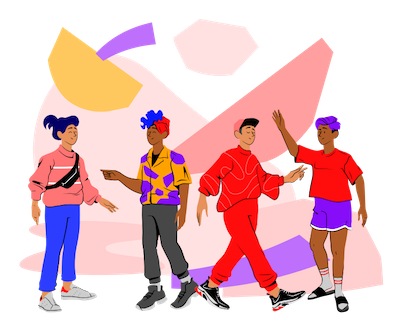|  | | | Bonjour mon ami(e) In this week's edition, be ready for a humorous French idiom 'Slurp la limace', and learn more about expressions such as 'cercle d'amis', 'heure', 'atteindre', 'festif', and 'que'. |
| |
| |
|
|
cercle d'amis In French, 'cercle d'amis' is used to refer to a close group of friends. It can be used in various contexts, just like in English. For instance, you can say 'Mon cercle d'amis est très important pour moi', which means 'My circle of friends is very important to me'. Here's how to use it: La confiance est importante dans un cercle d'amis. C'est un secret, ne le partagez pas avec votre cercle d'amis. Mon cercle d'amis est très diversifié.
| |
|
heure The French word for hour is 'heure.' It's used very much as it is in English, referring to a period of time equal to a 24th of a day and night. For example, 'Une heure' is 'one hour'. However, unlike in English, when telling time, French speakers commonly use the 24-hour clock (military time) instead of the 12-hour clock. Here's how to use it: Il est cinq heures du matin. Elle arrive à sept heures. Je vais me coucher à une heure tardive.
| |
|
atteindre The French word 'atteindre' is used to express the action of reaching something or someone. It can be used in many different contexts, just like the English word 'reach'. For example, it can be used to discuss reaching a destination or a goal. It can also be used metaphorically, similar to how you might say 'reach a conclusion' in English. Here's how to use it: Elle espère atteindre ses objectifs cette année. Il n'a pas pu atteindre les exigences du cours. Il semble difficile d'atteindre un consensus sur cette question.
| |
|
festif The French word 'festif' is used to describe any event, activity, or atmosphere that is joyful or celebratory, much like the use of 'festive' in English. It is often used in the context of holidays, parties, or other celebratory events. Here's how to use it: Elle avait une allure festive. Les lumières festives ont illuminé la rue. Son attitude festive a amélioré l'ambiance.
| |
|
que The French word 'que' is used in the same way as 'than' in English. It is used when making comparisons, for example: 'Elle est plus grande que moi' means 'She is taller than me'. Just like 'than', 'que' introduces the second element that is being compared. Remember that the construction of sentences may change, depending on whether you are comparing nouns, verbs, or adjectives. Here's how to use it: | |
|
😆😆😆 Slurp la limace: C'est Robert qui mange sa salade et Slurppp la limace. | |
|
| Never stop learning, Mike from LangBites PS If you are enjoying these emails, buying me a coffee is much appreciated! 🙏🏼 | |
|
| You received this email because you signed up at LangBites.co. Click here to unsubscribe. |
| |
|
|
|

